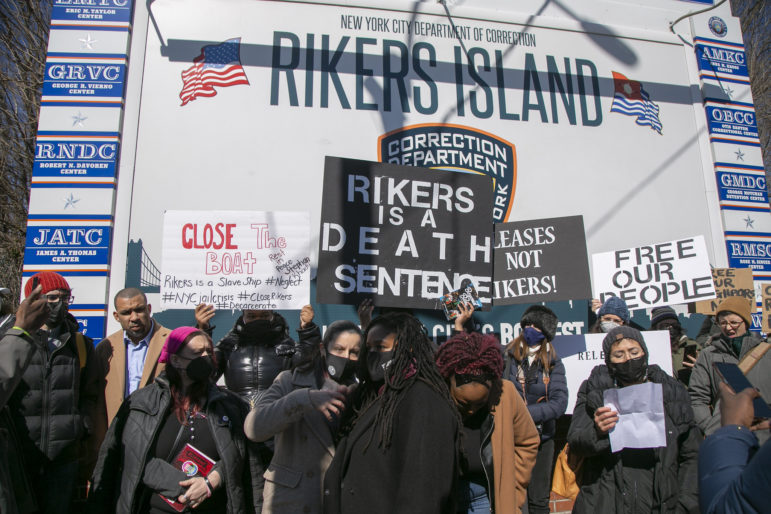“Treatment Not Jail offers the possibility of mental health treatment courts for all justice-involved New Yorkers and improves upon the prevailing model of drug courts.”

William Alatriste/NYC Council Media Unit
Elected officials and activists at a rally at Rikers Island in February 2022.Imagine that you are among the 1 in 5 people in New York who have mental health and substance use challenges that have rarely been addressed because you were born into a world of systemic injustice, poverty and lack of access to care.
Now imagine you are charged with a crime, unaffordable bail is set and you are jailed in squalid conditions without meaningful mental health care. Because there is no law creating mental health courts for all New Yorkers, you face months or years in the hell of incarceration and endure subpar treatment in a traumatizing environment that exacerbates your vulnerabilities.
Strikingly, New York currently incarcerates 40,000 people, almost half of whom are diagnosed with a mental health disorder. New York incarcerates more people with mental illness than it treats in hospitals.
Imagine another scenario where The Treatment Not Jail Act is in effect. This law recognizes that justice-involved New Yorkers have experienced racial and economic injustice, unstable housing, and insufficient healthcare and education. Now your humanity is recognized and you are offered community-based treatment with the chance to emerge from jail without a criminal conviction. This will allow you to procure housing, employment, and, everything needed to maintain stability. You and society benefit because you received treatment, not jail.
State lawmakers must make this a reality by enacting the Treatment Not Jail Act this legislative session.
Encouragingly, recent amendments to the State’s bail laws now direct judges to send cases to mental health “treatment courts.” However, this provision is currently impracticable in that mental health courts are not yet the law of New York. Treatment Not Jail allows implementation of this provision by ensuring that every county in New York State can access mental health courts.
It is a lie that incarceration makes communities safer. The research overwhelmingly shows that jail and prison make people more likely to re-offend. Too often, people languish behind bars without treatment while counter-productively exposed to violence and drugs.
Released into shelters without stable housing, medical and mental health care, they are expected to navigate housing, treatment, employment and benefits despite the adverse collateral consequences of their criminal conviction and a debilitating mental health diagnosis that makes it difficult to function. Increased substance use, psychological decompensation, and recidivism follow in a grotesque revolving door harming not only these individuals, but also our communities.
It is false that people living with mental illness are a risk to public safety. In fact, they are 10 times more likely to be the victim and not perpetrator of violence. It is also incorrect that people with violent charges do not equally succeed in community-based treatment as do people charged with non-violent crimes. Indeed, treatment court graduates are 50 percent less likely to recidivate. We must follow the facts and not fear mongering.
Statutory drug courts were created in 2009 for people with substance dependence charged with select offenses. Treatment Not Jail expands this decades old law to now include people with mental health diagnoses charged with any offense.
It costs $556,000 to incarcerate a person on Rikers Island per year. Diversion promotes reinvestment into impacted communities, grows quarterly employment rates by nearly 50 percent over 10 years, and eliminates the high financial costs of incarceration. Treatment Not Jail offers the possibility of mental health treatment courts for all justice-involved New Yorkers and improves upon the prevailing model of drug courts. It empowers judges to order clinical evaluations and then decide, on a case-by-case basis, whether treatment will benefit both the individual and public safety.
New York’s current system fails all of us. We must expand existing law to make our communities safer and healthier. To do so recognizes that safety and fairness are not contradictory but interdependent, and that people with substance use struggles, mental health challenges and other disabilities are also entitled to security and freedom from over-incarceration, dehumanization and stigmatization.
Katherine LeGeros Bajuk is a mental health attorney with New York County Defender Services. Jeffrey Berman is a mental health attorney with The Legal Aid Society.









2 thoughts on “Opinion: For The Sake Of Public Health and Safety, Pass The Treatment Not Jail Act”
Well said, best of luck in getting everyone on board.
Jeffery Berman represented me when I was 19 getting treatment over jail time saved me. I always remembered how he treated me with respect .And his suits always well dressed. I never got to Thank him. My mother is forever grateful as well in part because of him I got to have a career get married and live a real life. Thank you Jeffery .